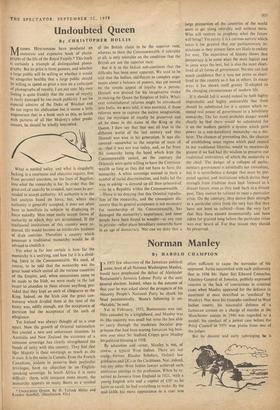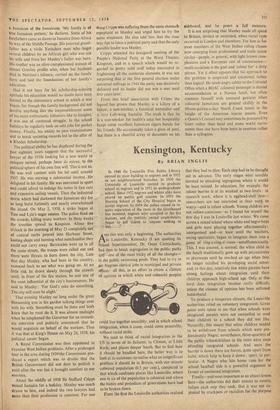Norman Manley
By HAROLD CHAMPION
N 1953 few observers of the Jamaican political I scene, least of all Norman Washington Manley, would have prophesied the defeat of Alektinder Bustamante's Jamaica Labour Party at the next general election. Indeed, when in the autumn of that year he was asked about the prospects of his minority People's National Party he shook his head pessimistically. 'Busta's following is un- shakable,' he said.
Yet in February, 1955, Bustamante was out, little consoled by a knighthood, and Manley was in. His majority was small but none the less able to carry through the moderate Socialist pro- gramme that had been scaring Jamaican big busi- ness ever since Sir Stafford Cripps gave Manley his political blessing in 1938..
By education and career, Manley is not, of course, a typical West Indian. There are not many. former Rhodes Scholars, Oxford law graduates and QCs in the Caribbean. Nor, indeed, has any other West Indian lawyer achieved such enormous prestige in the profession. When he re- turned to Jamaica from England in 1921, 'with a young English wife and a capital of £50' as he loves to recall, he had everything to make. By the mid-1930s his mere appearance in a case was often sufficient to cause the surrender of his opponent. Juries succumbed with such uniformity that in 1936 Mr. (later Sir) Edward Comacho, Attorney-General of Jamaica, publicly expressed concern at the lack of convictions in criminal cases when Manley appeared for the defence (a statement at once described as 'unethical' by Manley). Nor Were his triumphs confined to West Indian courts; his successful defence of a Jamaican airman on a charge of murder at the Manchester assizes in 1946 was regarded as a model; his conduct of a patent case before the Privy Council in 1951 won praise from one of the judges.
But by descent and early upbringing he is a Jamaican of the Jamaicans. 'My family is of true Jamaican pattern,' he declares. Some of his forefathers came as slaves to Jamaica from Africa by way of the Middle Passage. His paternal grand- father was a virile Yorkshire man who begot several children by an African girl who was not his wife and from her Manley's father was born. His mother was an olive-complexioned woman of almost Grecian profile who, when her husband died in Norman's infancy, carried on the family farm and laid the foundations of her family's education.
Had it not been for his scholarship-winning aptitude his education would no doubt have been limited to the elementary school in which it was begun, for though the family background did not involve anything like the impoverishment some of his more enthusiastic followers like to imagine, it was one of continual struggle. In the school holidays he regularly took on odd jobs for pocket money. Finally, his ability to pass examinations and to break sprinting records led to the offer of a Rhodes Scholarship.
The political ability he has displayed during the past eighteen years suggests that the successful lawyer of the 1930s looking for a new world to conquer turned, perhaps faute de Weitz, to the Political sphere of his own free will. This is not so. He was well content with his lot until around 1937. He was earning a substantial income. He delighted in his family. He was interested in sport and could afford to indulge his tastes in fast cars and expensive sailing vessels. Then the industrial storm which had darkened the Jamaican sky for so long burst furiously and nearly overwhelmed the island. On May 2, 1938, a strike began at Tate and Lyle's sugar estates. The police fired on the crowds, killing many workers. In three weeks the troubles spread to Kingston. About five o'clock in the morning of May 23 completely out of control mobs poured into Harbour Street, looting shops and burning what merchandise they could not carry away. Barricades went up in all the main streets, the troops were called sant and there were threats to burn down the city. Late that day Manley, who had been in the country, motored back to see what was going on. At no little risk he drove slowly through the crowds until, in front of the fire station, he met one of the most influential of the city's businessmen. He said to Manley : 'For God's sake do something. The city will soon be alight.'
That evening Manley sat long under the great blossoming tree in his garden talking things over With his wife. Something must be done and both knew that he must do it. It was almost midnight when he telephoned the Governor for an immedi- ate interview and publicly announced that he would negotiate on behalf of the workers. Thus it was that at King's House on May 24, 1938, his political career began.
A Royal Commission was then appointed to examine West Indian problems. After a prolonged tour in the area during 1939.the Commission pro- duced a report which was so drastic that the British Government did not dare to publish it until after the war lest it brought comfort to our enemies.
About the middle of 1938 Sir Stafford Cripps visited Jamaica for a holiday. Manley was much drawn to him, and indeed the two lawyers had more than their profession in common. For one thing Cripps was suffering from the same stomach complaint as Manley and urged him to try the same treatment. He also told him that the time was ripe to form a political party and that the only possible leader was Manley.
Cripps attended the inaugural meeting of the People's National Party at the Ward Theatre, Kingston, and in a speech which would be re- garded as pretty, mild stuff today succeeded in frightening all the moderate elements. It was not surprising that at the first general election under universal suffrage in 1944 the party was decisively defeated and its leader did not win a seat until five years later.
From this brief association with Cripps the legend has grown that Manley is a killjoy of a fellow, a non-smoker, a fanatical teetotaller and a very Left-wing Socialist. The truth is that he is a non-smoker for health's sake but hospitably keeps some excellent Jamaican cigars handy for his friends. He occasionally takes a glass of port, but there is a cheerful array of decanters on his sideboard, and he pours a full measure.
It is not surprising that Manley made all speed to Britain, invited or uninvited, when racial riots occurred in London and elsewhere. For him as for most members of the West Indian ruling classes now emerging from professional and trade union circles—people, in general, with light brown com- plexions and a European cast of countenance- multi-racialism is the goal and 'colour bar' a dirty phrase. Yet it often appears that his approach to the problem is empirical and emotional rather than logical. He sends angry cables to the Colonial Office when a BOAC coloured paisenger is denied accommodation at a Nassau hotel, but often contents himself with annoyed gestures when coloured Jamaicans are greeted chillily in the fifteen-guinea-a-day North Coast hotels in the height of the American tourist season. Even a Queen's Counsel may sometimes be prompted by heart rather than head and more world move- ments than one have been born in emotion rather than a syllogism.



































 Previous page
Previous page